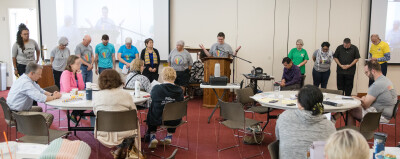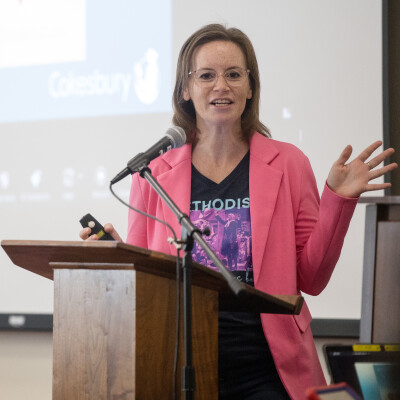BWARM Annual Meeting Highlights Radical Methodist Roots and Ongoing LGBTQ+ Advocacy
Approximately 50 members of the Baltimore-Washington Area Reconciling United Methodists (BWARM) gathered on September 13 at the Baltimore-Washington Conference Mission Center for their annual meeting, a day that wove together worship, organizational business, and a keynote address by Dr. Ashley Boggan.
The morning opened with words from Rev. Erica Robinson-Johnson, who brought greetings on behalf of Bishop Easterling. Bishop Easterling was unable to attend due to a prior commitment, but Robinson-Johnson reflected on her own 30 years in ministry and the milestones of the 2024 General Conference and the enduring urgency of BWARM’s advocacy. “We need this work, we need this advocacy,” she said, thanking BWARM for providing a faithful model for channeling energy, frustration, and hope into building an inclusive church.
 Business followed, with members affirming a new mission statement that emphasizes celebrating people of all sexual orientations and gender identities in every aspect of church life. Treasurer George Kahn encouraged congregations to include BWARM in their budgets, noting that contributions also support broader justice initiatives. Members then elected a new slate of leaders and unanimously passed revised bylaws designed to strengthen governance.
Business followed, with members affirming a new mission statement that emphasizes celebrating people of all sexual orientations and gender identities in every aspect of church life. Treasurer George Kahn encouraged congregations to include BWARM in their budgets, noting that contributions also support broader justice initiatives. Members then elected a new slate of leaders and unanimously passed revised bylaws designed to strengthen governance.
The centerpiece of the gathering was the keynote address from Dr. Boggan, General Secretary of the General Commission on Archives and History and author of Wesleyan Vile-tality. In a sweeping historical retelling, Boggan urged participants to reclaim Methodism’s radical roots as a movement marked by disruption, boundary-crossing, and love.
She highlighted John Wesley’s willingness to preach outdoors, “I submitted to be more vile,” Wesley wrote in his journal, as well as the “holy club” at Oxford that challenged social and moral boundaries of its day. Boggan recounted Wesley’s presence at the 1732 trial of Thomas Blair, sentenced for having a sexual relationship with another man, where Wesley’s concern for justice led him to raise funds to spare Blair from crushing debt.
 “Class and band meetings, where people confessed sins and supported one another with remarkable intimacy, were themselves queering the social norms,” Boggan said. Quoting Wesley’s reply to a bishop who tried to restrict his preaching, “I look upon the world as my parish.” She challenged attendees to embrace a Methodist identity rooted not in pedigree or regulation but in chosen belonging.
“Class and band meetings, where people confessed sins and supported one another with remarkable intimacy, were themselves queering the social norms,” Boggan said. Quoting Wesley’s reply to a bishop who tried to restrict his preaching, “I look upon the world as my parish.” She challenged attendees to embrace a Methodist identity rooted not in pedigree or regulation but in chosen belonging.
Boggan also introduced the newly launched Center for United Methodist LGBTQ+ Heritage. Preserving and amplifying queer Methodist stories, she said, ensures future generations will recognize themselves in the church’s history.
In conversation with attendees, Boggan stressed the importance of oral histories, preserving overlooked voices, and equipping congregations to engage with archival resources. “The agencies we have are the spaces where if your church wants to learn more, go to the agencies,” she said. “We have lots of resources, and they are all underutilized.”
The day concluded in worship, with communion and prayer, sending participants back into their ministries renewed and reconnected.
If you’d like to book Dr. Ashley Boggan to speak at your event, you can email her at .
